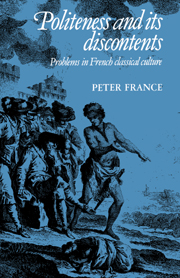3 - Myth and modernity: Racine's Phèdre
Published online by Cambridge University Press: 20 October 2009
Summary
Phaedra, daughter of Minos and Pasiphaë, granddaughter of the sun, half-sister to the Minotaur, is the wife of Theseus, the slayer of the Minotaur and other monsters. Hounded by Venus (Aphrodite), she falls in love with Hippolytus, son of Theseus, and an Amazon queen. Hippolytus loves a descendant of Vulcan and Gaia (the Earth). Theseus, returning from the underworld, is misled into believing his son guilty of loving Phaedra and calls on his tutelary god Neptune (Poseidon) to avenge him. A monster emerges from the sea and causes Hippolytus to be dragged to death by his horses. Phaedra poisons herself.
Such is the subject of the play in which Racine, drawing on Euripides and others, gave his public ‘ce que j'ai mis de plus raisonnable sur le théâatre’ (Preface to Phèdre). What could these ancient and monstrous events mean to the Christian subjects of Louis XIV, to the polite contemporaries of Descartes and Fontenelle? Let me approach this subject in a roundabout manner, starting from our own century and what it has made of Racine.
At the time of the First World War the Russian poet Osip Mandelstam was a member of the Acmeist group, who proclaimed as part of their programme a belief in the traditional craft of the word. This meant a choice of ancestors.
- Type
- Chapter
- Information
- Politeness and its DiscontentsProblems in French Classical Culture, pp. 40 - 50Publisher: Cambridge University PressPrint publication year: 1992



